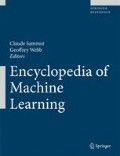Recommended Reading
Abelson, R. P., Aronson, E., McGuire, W. J., Newcomb, T. M., Rosenberg, M. J., & Tannenbaum, R. H. (Eds.), (1968). Theories of cognitive consistency: A sourcebook. Chicago: Rand McNally.
Clerc, M. (2006). Particle swarm optimization. London: Hermes Science Publications.
Clerc, M., & Kennedy, J. (2002). The particle swarm: Explosion, stability, and convergence in a multi-dimensional complex space. IEEE Transactions on Evolutionary Computation, 6, 58–73.
Eberhart, R.C., & Kennedy, J. (1995). A new optimizer using particle swarm theory. In Proceedings of the 6th international symposium on micro machine and human science, (Nagoya, Japan) (pp. 39–43). Piscataway, NJ: IEEE Service Center.
Festinger, L. (1957). A theory of cognitive dissonance. Stanford, CA: Stanford University Press.
Heider, F. (1958). The psychology of interpersonal relations. New York: Wiley.
Janson, S., & Middendorf, M. (2005). A hierarchical particle swarm optimizer and its adaptive variant. IEEE Transactions on Systems, Man, and Cybernatics – Part B: Cybernatics, 35(6), 1272–1282.
Kennedy, J. (1998). The behavior of particles. In V. W. Porto, N. Saravanan, D. Waagen, & A. E. Eiben (Eds.), Evolutionary programming VII. Proceedings of the 7th annual conference on evolutionary programming.
Kennedy, J. (2003). Bare bones particle swarms. In Proceedings of the IEEE swarm intelligence symposium (pp. 80–87). Indianapolis, IN.
Kennedy, J. (2005). Dynamic-probabilistic particle swarms. In Proceedings of the genetic and evolutionary computation conference (GECCO-2005) (pp. 201–207). Washington, DC.
Kennedy, J., & Eberhart, R. C. (1995). Particle swarm optimization. In Proceedings of the 1995 IEEE international conference on neural networks (Perth, Australia) (pp. 1942–1948). Piscataway, NJ: IEEE Service Center.
Kennedy, J., & Eberhart, R. C. (1997). A discrete binary version of the particle swarm algorithm. In Proceedings of the 1997 conference on systems, man, and cybernetics (pp. 4104–4109). Piscataway, NJ: IEEE Service Center.
Krohling, R. A. (2004). Gaussian Swarm. A novel particle swarm optimization algorithm. Proceedings of the 2004 IEEE conference on cybernetics and intelligent systems (vol. 1, pp. 372–376).
Mendes, R. (2004). Population topologies and their influence in particle swarm performance. Doctoral thesis, Escola de Engenharia, Universidade do Minho, Portugal.
Nowak, A., Szamrej, J., & Latané, B. (1990). From private attitude to public opinion: A dynamic theory of social impact. Psychological Review, 97, 362–376.
Owen, A., & Harvey, I. (2007). Adapting particle swarm optimisation for fitness landscapes with neutrality. In Proceedings of the 2007 IEEE swarm intelligence symposium (pp. 258–265). Honolulu, HI: IEEE Press.
Ozcan, E., & Mohan, C. K. (1999). Particle swarm optimization: Surfing the waves. In Proceedings of the congress on evolutionary computation, Mayflower hotel, Washington D.C. (pp. 1939–1944). Piscataway, NJ: IEEE Service Center.
Peña, J., Upegui, A., & Eduardo Sanchez, E. (2006). Particle swarm optimization with discrete recombination: An online optimizer for evolvable hardware. In Proceedings of the 1st NASA/ESA conference on adaptive hardware and systems (AHS-2006), Istanbul, Turkey (pp. 163–170). Piscataway, NJ: IEEE Service Center.
Richer, T. J., & Blackwell, T. M. (2006). The Levy particle swarm. In Proceedings of the 2006 congress on evolutionary computation (CEC-2006). Piscataway, NJ: IEEE Service Center.
Shi, Y., & Eberhart, R. C. (1998). Parameter selection in particle swarm optimization. In Evolutionary Programming VII: Proc. EP98 (pp. 591–600). New York: Springer.
Smolensky, P. (1986). Information processing in dynamical systems: Foundations of harmony theory. In D. E. Rumelhart, J. L. McClelland, & the PDP Research Group, (Eds.), Parallel distributed processing: Explorations in the microstructure of cognition. Vol. 1, Foundations (pp. 194–281). Cambridge, MA: MIT Press.
Suganthan, P. N. (1999). Particle swarm optimisation with a neighbourhood operator. In Proceedings of congress on evolutionary computation. Washington DC, USA.
Thagard, P. (2000). Coherence in thought and action. Cambridge, MA: MIT Press.
Author information
Authors and Affiliations
Editor information
Editors and Affiliations
Rights and permissions
Copyright information
© 2011 Springer Science+Business Media, LLC
About this entry
Cite this entry
Kennedy, J. (2011). Particle Swarm Optimization. In: Sammut, C., Webb, G.I. (eds) Encyclopedia of Machine Learning. Springer, Boston, MA. https://doi.org/10.1007/978-0-387-30164-8_630
Download citation
DOI: https://doi.org/10.1007/978-0-387-30164-8_630
Publisher Name: Springer, Boston, MA
Print ISBN: 978-0-387-30768-8
Online ISBN: 978-0-387-30164-8
eBook Packages: Computer ScienceReference Module Computer Science and Engineering

